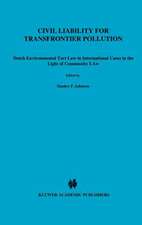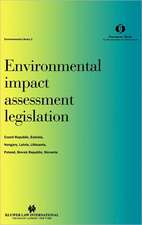How to Deal with Climate Change?: Institutional Adaptive Capacity as a Means to Promote Sustainable Water Governance
Autor Beatrice Moselloen Limba Engleză Hardback – 25 mar 2015
| Toate formatele și edițiile | Preț | Express |
|---|---|---|
| Paperback (1) | 557.53 lei 39-44 zile | |
| Springer International Publishing – 6 oct 2016 | 557.53 lei 39-44 zile | |
| Hardback (1) | 644.82 lei 6-8 săpt. | |
| Springer International Publishing – 25 mar 2015 | 644.82 lei 6-8 săpt. |
Preț: 644.82 lei
Preț vechi: 758.60 lei
-15% Nou
Puncte Express: 967
Preț estimativ în valută:
123.39€ • 131.94$ • 102.88£
123.39€ • 131.94$ • 102.88£
Carte tipărită la comandă
Livrare economică 17 aprilie-01 mai
Preluare comenzi: 021 569.72.76
Specificații
ISBN-13: 9783319153889
ISBN-10: 3319153889
Pagini: 300
Ilustrații: XIX, 237 p. 13 illus. in color.
Dimensiuni: 155 x 235 x 17 mm
Greutate: 0.54 kg
Ediția:2015
Editura: Springer International Publishing
Colecția Springer
Locul publicării:Cham, Switzerland
ISBN-10: 3319153889
Pagini: 300
Ilustrații: XIX, 237 p. 13 illus. in color.
Dimensiuni: 155 x 235 x 17 mm
Greutate: 0.54 kg
Ediția:2015
Editura: Springer International Publishing
Colecția Springer
Locul publicării:Cham, Switzerland
Public țintă
ResearchCuprins
1 Governing water in times of climate (and other) changes.- 2 Water governance throughout history and science.- 3 Is it possible to investigate the future with knowledge from the past? A con-ceptual framework to study institutional adaptive capacity.- 4 The Po River Basin.- 5 The Syr Darya River Basin.- 6 Resistant, reactive or proactive institutions? Exploring adaptive water re-sources management in the Po and Syr Darya River basins.- 7 Conclusions: Summing up, Zooming out, New challenges ahead.
Textul de pe ultima copertă
As the evidence for human-induced climate change becomes more obvious, so too does the realisation that it will harshly impact on the natural environment as well as on socio-economic systems. Addressing the unpredictability of multiple sources of global change makes the capacity of governance systems to deal with uncertainty and surprise essential. However, how all these complex processes act in concert and under which conditions they lead to the sustainable governance of environmental resources are questions that have remained relatively unanswered. This book aims at addressing this fundamental gap, using as case examples the basins of the Po River in Northern Italy and the Syr Darya River in Kyrgyzstan. The opening chapter addresses the challenges of governing water in times of climate and other changes. Chapter Two reviews water governance through history and science. The third chapter outlines a conceptual framework for studying institutional adaptive capacity. The next two chapters offer detailed case studies of the Po and Syr Darya rivers, followed by a chapter-length analysis and comparison of adaptive water resources management in the two regions. The discussion includes a description of resistant, reactive and proactive institutions and puts forward ideas on how water governance regimes can transition from resistant to proactive. The final chapter takes a high-level view of lessons learned and how to transform these into policy recommendations and offers a perspective on embracing uncertainty and meeting future challenges.
Caracteristici
Combines high quality research with expert assessment of political implications in water resource governance Presents an original comparative approach, focusing on cases which are under-studied in existing literature Offers a dynamic combination between the literature and methodology of political science and those of international relations, geography and development























